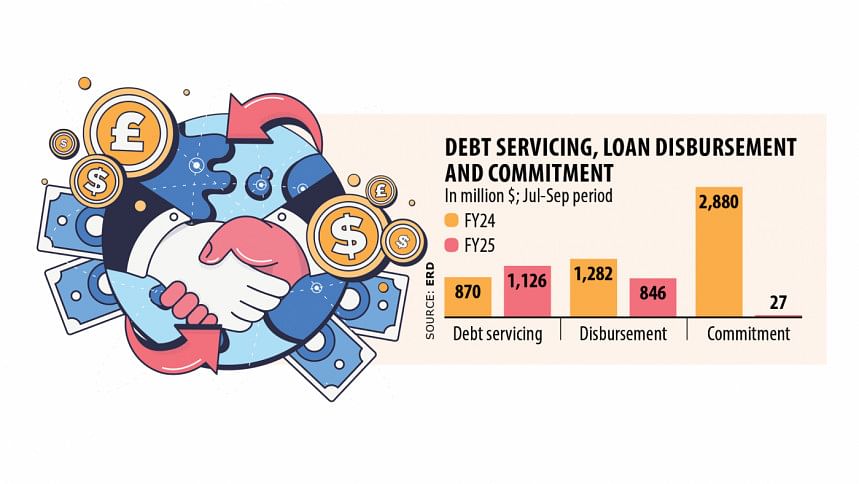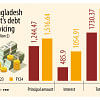Foreign debt servicing surges 29% in Jul-Sep

Bangladesh's foreign debt servicing surged 29 percent year-on-year in the first three months of fiscal 2024-25 owing to the country's expanded foreign loan portfolio and the rise in global interest rates.
Bangladesh returned $1.13 billion in principal and interest payments on foreign loans during the July-September period of FY25, up from $870 million during the same quarter of FY24, according to data of the finance ministry.
On an individual basis, the value of principal payments climbed by 31 percent to $685.50 million while interest costs rose by 17 percent to $441 million.
And in a report, titled "Medium-Term Macroeconomic Policy Statement (MTMPS)", the finance ministry said interest payments would continue to rise gradually in the coming years.
The proportion of external interest payments as a percentage of the national budget will rise to 2.6 percent in FY27 from 0.9 percent in FY22, reflecting the growing impact of external debt, the report said.
"Higher interest rates and shorter grace and maturity periods for foreign loans are contributing to the burden of debt servicing," said Zahid Hussain, a former lead economist of the World Bank's Dhaka office.
"Over the past decade, we have seen a surge in these two factors of external loans. As such, all external loans are now costlier, including those from Japan," he added.
Hussain also said he believes the burden will rise in the future.
Professor Selim Raihan, executive director of the South Asian Network on Economic Modeling (Sanem), said the country is having to pay for the indiscriminate external borrowing by the previous government.
Hussain added that the burden will not decrease anytime soon though, as the grace period for many external loans will expire in 2026 and 2027.
Still though, the Economic Relations Division (ERD) says the debt burden will reduce after 2031.
"Also, if the interest rates on new loans do not decrease, then there is no possibility of reducing the burden of debt servicing," he said.
For example, the Secured Overnight Financing Rate (SOFR) has already been reduced to 4.8 percent from 5.3 percent. So, the burden could be eased with new loans bearing lower interest.
Hussain also underscored the need for ensuring proper utilisation of foreign funds.
"Many development projects could become a problem for the nation if they do not bring any returns soon," he said.
Against this backdrop, he pointed out that the foreign funded Rupsha 800-Megawatt Combined Cycle Power Plant is yet to begin operations due to delays in getting gas connections.
Sanem Executive Director Raihan termed the Bangabandhu Tunnel project as a "white elephant".
The ousted government took many projects without ensuring proper feasibility studies or estimating their economic returns, he said.
It had even struggled to engage important stakeholders for project site selections.
Besides, the previous authorities implemented projects to their own advantage or that of vested groups. As a result, project costs had skyrocketed.
"Now, we have to carry that debt burden," Raihan added.
Meanwhile, loan disbursement by global lenders and multilateral partners fell by 33 percent year-on-year to $846 million in the July-September period of FY25.
He informed that the cost to service Bangladesh's borrowing from multilateral and bilateral lenders surpassed the amount received from them during the first three months of FY25.
Regarding the lower disbursement, Raihan blamed the recent political unrest and hoped that they may rise in the coming days.
In the first three months, the highest amount of loans disbursed was $210 million from Japan. During this time, the country's development partners made loan commitments of only $27.41 million compared to $2.88 billion during the same period a year ago.


 For all latest news, follow The Daily Star's Google News channel.
For all latest news, follow The Daily Star's Google News channel. 






Comments